This article has been edited to reflect that the Ivory Coast, not the Philippines, is the first country in the world to arrest a former head of state or government and assist in their transfer to the ICC.
On March 11, police in Manila arrested former Philippines President Rodrigo Duterte pursuant to an International Criminal Court (ICC) arrest warrant. Prosecutors allege that Duterte is criminally responsible for the crime against humanity of murder in the context of the “war on drugs” in the Philippines. (Crimes against humanity are one of four crimes that the ICC investigates and prosecutes, the others being war crimes, genocide, and aggression.)
Manila has previously reported that about 6,300 people were killed in so-called anti-drug operations between July 1, 2016, and May 31, 2022, a period covering all but the last month of Duterte’s presidency. However, some human rights organizations estimate that the death toll was closer to 30,000 people, most of them poor men who were gunned down in the streets.
ICC prosecutors allege that Duterte and his (as yet unnamed) co-perpetrators jointly and through others led a program of action to “‘neutralise’ individuals they identified as alleged criminals or individuals with criminal propensities” during his time as president and, before that, mayor of Davao City.
Duterte, 80, contested the arrest, but he was put on a plane to the Netherlands within hours and is now in the ICC’s custody. The arrest warrant—and Manila’s decision to comply with it—shows that no one, not even a head of state or government, is free to violate international law.
Current and former leaders (including those with outstanding ICC warrants, notably Russia’s Vladimir Putin, Israel’s Benjamin Netanyahu, and Sudan’s Omar Al-Bashir) have been warned: though they have evaded the court thus far, they may one day find themselves before it.
There is no statute of limitations on crimes against humanity—of which Al-Bashir, Duterte, Netanyahu, and Putin are accused, among other abuses—and domestic and international politics can shift from opposing to supporting compliance with the ICC. If Duterte’s case is any indication, a leader’s streak of avoiding accountability can run out.
The ICC started, paused, and restarted an investigation into the war on drugs
The ICC’s jurisdiction in the Philippines spans the period from November 1, 2011 (when Manila joined the court) to March 16, 2019 (when Manila left the court). Duterte, a longtime vocal opponent of the ICC, withdrew the Philippines’ membership on March 17, 2018, about a month after the chief prosecutor at the time, Fatou Bensouda, announced a preliminary examination into the war on drugs. (The withdrawal took effect the next year.)
Later in May 2021, Bensouda submitted a request to the ICC’s pretrial chamber to escalate her probe from a preliminary examination to a full investigation. The judges granted the request in September of that year.
But, two months after that, in November, Duterte’s government requested that the ICC defer to Philippines national authorities, consistent with the principle of complementarity: so long as a country conducts genuine proceedings into conduct that is substantially similar to conduct that the ICC is investigating, the court must step aside.
But Bensouda’s successor, Karim Khan, concluded in June 2022—while Duterte was still in office—that the Philippines government hadn’t undertaken genuine proceedings of its own. Khan, therefore, asked the pretrial chamber to continue the investigation. The judges agreed with his assessment in January 2023 and allowed the investigation to resume.
Though the Philippines is no longer a member, the ICC retains jurisdiction over suspected atrocities committed by nationals of the Philippines or on the country’s territory for the roughly seven and a half years when it was a member. This reflects both a strength and a limitation of the ICC: states can withdraw their consent to the court’s jurisdiction prospectively, though not retrospectively.
The ICC’s mandate represents another strength and limitation: the court is empowered to investigate and prosecute the most extreme forms of political violence, and this means that accountability for alleged perpetrators is often politicized. Duterte, the first leader from Asia ever charged by the ICC, has long inveighed against the court, accusing it of being biased against countries in the Global South. But as Bensouda once pointed out, how can the court be biased against Global South countries when it does its work on behalf of victims, in myriad contexts and countries around the world?
Duterte campaigned on extrajudicial killings
Duterte served as mayor of Davao City, one of the Philippines’ largest cities, on and off between 1988 and 2016. Known for his ruthless approach to crime, he earned himself the nickname “The Punisher.” Starting early in his tenure as mayor, he directed the Davao Death Squad (DDS), an irregular unit that he founded, which, alongside law enforcement, killed numerous people who were suspected of illegal activities, including drug offenses.
Duterte promised to nationalize these operations when he ran for president. He once brazenly declared on the campaign trail, “Forget the laws on human rights. If I make it to the presidential palace, I will do just what I did as mayor.” He continued, threatening that “drug pushers, hold-up men and do-nothings, you better go out. Because [I’ll] kill you.”
He won the 2016 election by an overwhelming margin.
Promises made, promises kept
Duterte kept his dark campaign promise, unleashing a violent national crackdown on crime and drugs. And, despite some public outcry from segments of Filipino society, he remained popular, month after month, year after year, owing in part to ascendant populism, historic public investments in infrastructure and social services, and citizens feeling that the government was working for them.
But he is now facing prosecution by the world’s foremost criminal court, which has been aided by former DDS and law enforcement personnel—a dramatic change in fortune for the former president.
Like all leaders, Duterte had a responsibility to keep his country safe, including from crime and illegal drugs. But no leader has a license to kill: directing extrajudicial killings violates rule-of-law principles like due process. Under the Philippines’ constitution and the International Covenant on Civil and Political Rights, which Manila ratified in 1986, everyone accused of a crime is entitled to a trial, and punishments for those found guilty must be consistent with existing statutes.
As it happens, the Philippines abolished the death penalty in 2006 (which Duterte attempted but failed to reinstate). So, there is no legal basis for a sentence of death—let alone a street killing—in the Philippines.
The crime against humanity of murder
When they granted prosecutors’ request for an arrest warrant, judges in the ICC’s pretrial chamber said that they had seen sufficient evidence at this stage for prosecutors’ contention that Duterte masterminded a crime against humanity.
Per the ICC’s Rome Statute, a crime against humanity involves a widespread or systematic attack on a civilian population carried out to advance an organizational policy. Prosecutors’ evidence indicates that thousands of Filipinos were killed over many years in anti-drug operations involving state and parastatal forces such as the DDS. The killings shared a number of common features, including victim profiles, and Duterte, as head of the DDS, mayor, and president, defined the scope and purpose of the operations and had de jure and de facto control over the various actors who carried them out.
The prosecutor’s office argued—and the pretrial chamber judges agreed—that, taken together, there are reasonable grounds to believe that Duterte is criminally responsible for the crime against humanity of murder. He and his co-perpetrators abused their power “to murder … the targeted population and treated the lives of their victims … as disposable.” Duterte’s government previously wrote off some deaths, including those of children, as unavoidable collateral damage. Officials at the ICC disagree: the killings were not just avoidable; they were unlawful.
A shift in national politics
It would be difficult to overstate how historic Duterte’s arrest is. The Philippines is only the second country in the world to arrest a former head of state or government and assist in their transfer to the ICC. (The other was Ivory Coast in the case of Laurent Gbagbo.) It is notable, too, that Duterte is facing prosecution for reported abuses related to the war on drugs, given both his and the policy’s historical popularity.
Also noteworthy is Philippines President Ferdinand Marcos, Jr.’s about-face. He previously vowed not to cooperate with the ICC, but ultimately approved Duterte’s arrest, citing an obligation to comply with Interpol, the world’s premier police cooperation and crime control organization.
Cynics might suggest that the ICC exploited the political rivalry between the Marcos and Duterte families to go after Duterte. While it’s true that Duterte’s daughter, the polemical, impeached vice president, Sara Duterte, may now have a harder time running against Marcos in the next presidential election, the ICC’s interest in her father and the drug war began well before the current rivalry.
Duterte in the Hague
Duterte made his first court appearance remotely via video from the ICC’s detention center on March 14, three days after his arrest. He was represented by Salvador Medialdea, who served in his administration, assisted by ICC defense counsel.
The ICC has a lengthy pretrial process: the next step will be a hearing in September to confirm the charges. Prosecutors, the defense, and victims’ legal representatives will present evidence, and judges will then decide if there is enough to proceed to trial. The trial itself could take years and would be subject to appeal.
The road ahead is long, and whatever happens to Duterte, bereaved families won’t get their loved ones back. But maybe they will see some justice served.
The Brookings Institution is committed to quality, independence, and impact.
We are supported by a diverse array of funders. In line with our values and policies, each Brookings publication represents the sole views of its author(s).
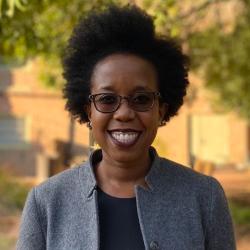
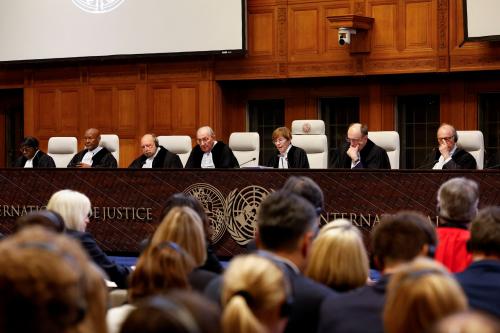
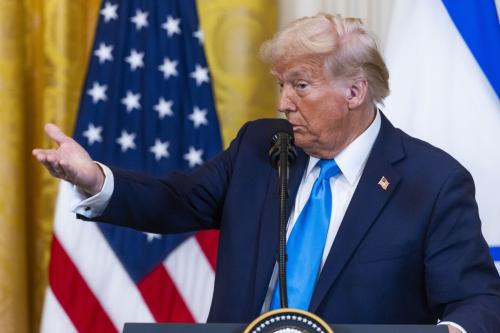
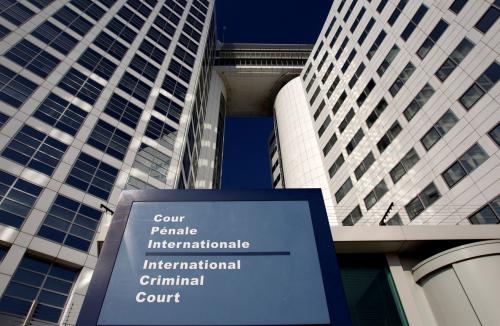
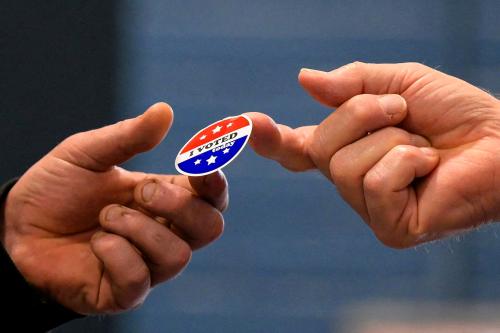
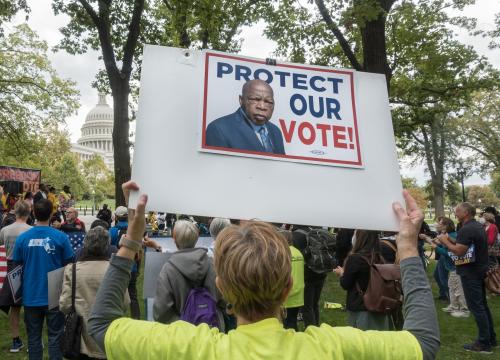
Commentary
Why did the Philippines turn over its former president to the ICC?
Manila’s arrest shows that leaders aren’t free to violate international law.
April 1, 2025